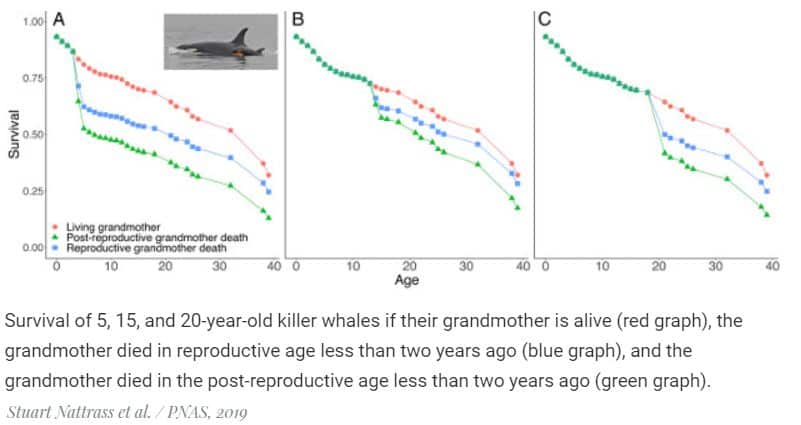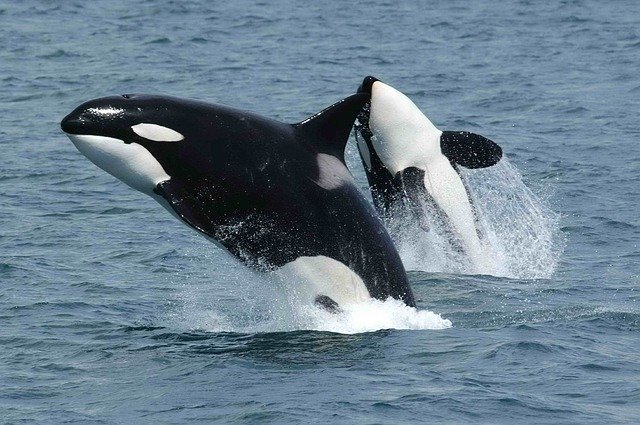Scientists have confirmed the correctness of the “grandmother hypothesis” for killer whales of the resident ecotype. As it turned out, after the death of old females, their grandchildren survive much less often than in families where grandmothers are still alive, according to the Proceedings of the National Academy of Sciences. And according to statistics, the older the grandmother was, the more she supported her grandchildren. The survival rate of killer whales in those groups where the grandmother died after her menopause was even lower than in families where the female matriarch of reproductive age died.
Researchers have repeatedly shown that the “grandmother hypothesis” is true for human communities. Children cared for by older women in the family were more likely to survive than those whose grandmothers had already died by the time they were born. Now there are several species of mammals besides humans, females of which live quite a long time after losing the ability to reproduce. Including these killer whales resident ecotype (they live near the coast and eat fish). Female killer whales lose their ability to reproduce at the age of about 40-45 years, but after that, they live for decades. Their life expectancy after menopause is 15.8 years. However, the question of the influence of orca grandmothers on the survival of grandchildren has not been studied in detail.
Researchers from Great Britain and Canada, led by Daniel W. Franks of York University, decided to find out. They analyzed the demographics of two populations of resident Pacific killer whales off the coasts of the United States and Canada. The population consists of several families, which consist of a female matriarch, her descendants and descendants of her daughters.
Observations of the northern population were carried out in 1973-2016, for the southern – in 1976-2016. Scientists took into account the birth and death years of all individuals in the population and looked at who their mother and maternal grandmother were. Information about mother and grandmother was known for 378 individuals, so the authors included only them in the sample. Using Cox Regression, which allows predicting the risk of an event, scientists calculated the survival of 5, 15 and 20-year-old killer whales and looked at how it changes depending on whether a particular grandmother is alive or she died less than two years ago. The authors took into account the age of grandmothers and looked at whether she had menopause at the time of death or not. For all cases, they calculated the hazard ratios (hazard ratio, HR) of animal death. Researchers also evaluated whether many or few Chinook salmon (the preferred food for individuals from the northern and southern populations) were in orca habitats in a given year.
It turned out that in the killer whale family, where the grandmother recently died, the mortality of her grandchildren was much higher (HR 4.5), compared with the groups in which the grandmothers were still alive. Moreover, such an attitude of risks was in those years when there was a lot of chinook salmon in the habitats of killer whales. In the hungry years, the survival of grandchildren without grandmothers was even lower (the authors do not give a risk ratio in this case). In families where the grandmother died already after the onset of menopause, her grandchildren died even more often (HR 6.7) than in those groups where the older female was still alive.

According to the authors, the results confirm the correctness of the “grandmother hypothesis” in killer whales. They also show that the onset of menopause in an older female affects the survival of her grandchildren. Presumably, females who are still raising their own cubs cannot behave like leaders and provide support to other offspring to the same extent as post-reproductive grandmothers do. Grandmothers who feed their own cubs need more food and probably they cannot share it with their grandchildren.
“The study shows that grandmothers who still give birth to cubs cannot provide their grandchildren with the same level of support as females who no longer breed. This means that after the appearance of menopause in the process of evolution, grandmothers were able to help their grandchildren more, ” says Franks. “The death of a grandmother in the post-reproductive period can have serious consequences for her family and she can be an important factor in assessing the future of resident killer whale populations. As the number of salmon fish continues to decline, grandmothers are likely to play an increasingly important role in the lives of these orca populations.”
Killer whales’ survival is affected not only by the death of their grandmother but also by other family members. As the researchers showed, the death of one of the killer whales in the group reduces the chances of others to survive, despite the strength of the bonds between the remaining family members and the establishment of new ties with animals from other groups.
